How to Report Medical Billing Fraud and Correct Your Bills
When you visit a doctor or a medical facility, they write your entire visit out in codes. These codes make medical billing straightforward, but they also make it possible for your insurance to be overcharged. If you're concerned about medical bills you've received, you should know how to .
Reporting health care fraud and abuse is not as simple as complaining about it to your doctor. Often, you may not even know that it has happened for months, if at all.
What happens if you find out and don't report medical billing fraud? Are there consequences? What if you suspect it, but aren't sure how to report it? DoNotPay has the answers that you are looking for, and we are always happy to help you discover how to handle this unimaginable situation.
What Is Fraudulent Medical Billing?
Anyone can become a victim of medical billing fraud. Doctors and their offices sometimes do it to get more money for their services. Often, it isn't done to take money out of your pocket, but it can take more from your insurance company, especially if you use Medicare or Medicaid.
You can usually keep track of what your doctor is charging through Medicare by taking notice of the letters you receive. It will tell you, usually quarterly, what bills have come to them. If you feel it is inaccurate, you can tell them about the discrepancy by reporting the medical provider for fraudulent billing.
Some examples of Medicare medical fraud to keep a look for are
- Overcharges
- Duplicate charges
- Wrong service dates
- Multiple charges for a single visit
- Or anything that doesn't make sense to you
If you notice any of these issues on your doctor bills or in your Medicare notices, reporting medical claims billing fraud should be your top priority. From there, you will need to discover to whom to report fraudulent use of CPT codes. This can be where things get confusing.
How To Report Medical Billing Fraud
If you suspect that you are a victim of medical billing fraud, the first thing you should do is to contact the following agencies:
| Agency | Contact Infomation |
| Federal Bureau of Investigation | Tips |
| Center for Medicare and Medicaid Services | Reporting Fraud |
| State Department of Health and Human Services | Submit a Hotline Complaint |
| Medicare Office | Reporting Medicare Fraud |
Each of these departments tries to make reporting health care fraud as easy as possible. In most cases, you will simply need to fill out a form. However, the simplicity of your claim may depend on the type of medical or Medicare fraud that you are reporting.
What Are the 4 Common Types of Medical Fraud?
There are many ways that a physician can commit billing fraud. However, the four most common types include
-
Upcoding
When your doctor upcodes, they end up billing your insurance company for a higher-priced service than you received. One example of this could be when the Emergency Room says you were there for 10 hours when you were only there for two or three hours.
-
Phantom Billing
A doctor who is abusing the system by phantom billing is charging your insurance for services that you never received. For instance, the doctor may say that you received critical care services when you were only being observed for a few hours to ensure you were in good health.
-
Overcharged Hospital Bills
Hospitals are notoriously expensive. While admitted, you will see a lot of doctors and have a lot of tests done. Therefore, overcharging is easy. The hospital, or one of its doctors, may say that you had tests done that you didn't in the hopes that it will slip past your notice.
-
Unbundling
Some services provided by your doctor can be included in one service CPT Code. However, to ensure that they make more money, they may choose to code it separately. By doing this, they may bill separately your surgery from the recovery. No matter what the circumstances are, unbundling for additional profits is still medical fraud.
Are There Penalties for Not Reporting Health Care Fraud?
Once you have determined the type of fraud that has been committed, you may wonder if it is worth it for you to report it. Some people may let it slide since it costs Medicare or Medicaid rather than them. This isn't always the best option.
You must understand reporting medical billing fraud is necessary, even if it doesn't come out of your pocket at the time of the service. Taxes pay for a lot of state or government medical programs. It is to ensure that low-income families have the help they need for medical expenses.
When a doctor skims money off the top by charging more than they should, others have to pay it back as higher taxes or lost healthcare. This is the biggest penalty for you, and it affects us all if you don't report what you have discovered.
If they find a physician guilty of healthcare fraud, they can face several penalties, including
- Fines for Each False Claim. This may be as much as $11,000 per offense, plus three times the amount of damages to the government.
- Criminal Fines. These fines can total up to $250,000.00.
- A doctor can face up to five years in jail as per the False Claims Act.
- Removal from Federal Health Care Programs. This may be temporary or permanent, depending on the offense.
Healthcare workers must report fraud. If the billing department or other staff does not report fraudulent billing, they may also face penalties.
Although it is in everyone's best interest to crack down on doctors and hospitals that try to commit medical billing fraud, the process isn't easy or something you can be done quickly. If you don't have time or know where to figure out billing codes and other things, DoNotPay is here to help.
DoNotPay Can Help You With Medical Billing Fraud Reporting
Healthcare fraud billing patients and filing a claim are both things that are difficult to handle. Some programs help insurance companies try to keep control of it. What do you have? You have DoNotPay.
DoNotPay can help you find the correct CPT codes for services that they provided you with. We can also write a demand letter to your healthcare provider to encourage them to correct the issue.
All you must do is
- Search Fight Medical Fraud on DoNotPay.
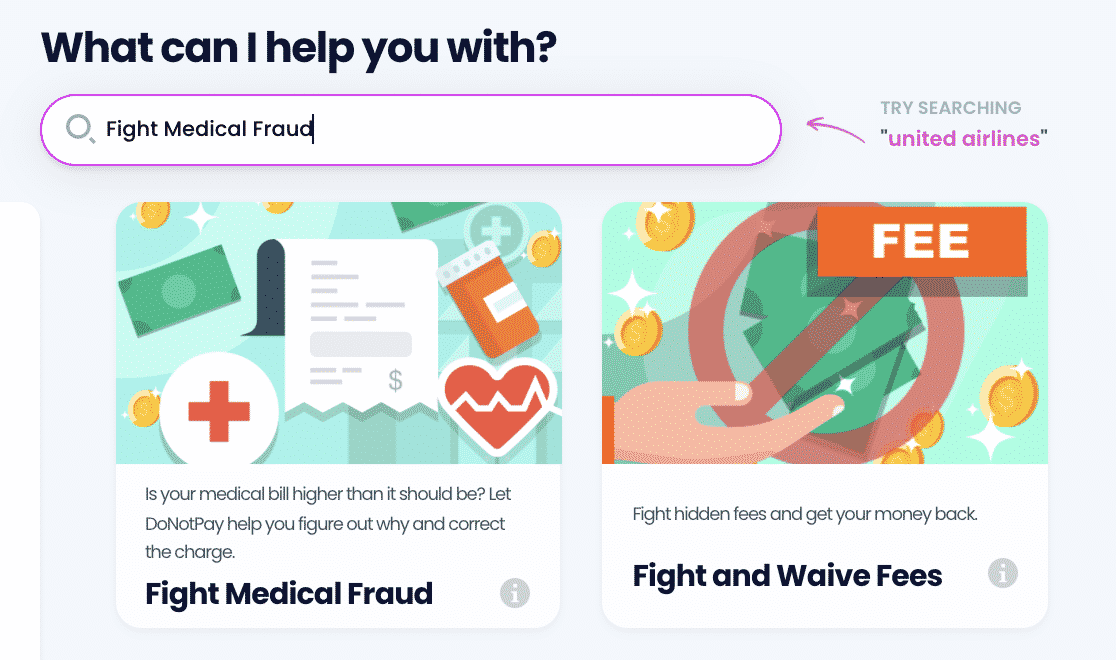
- Tell us the date of your visit, what you were treated for, and where you were treated.
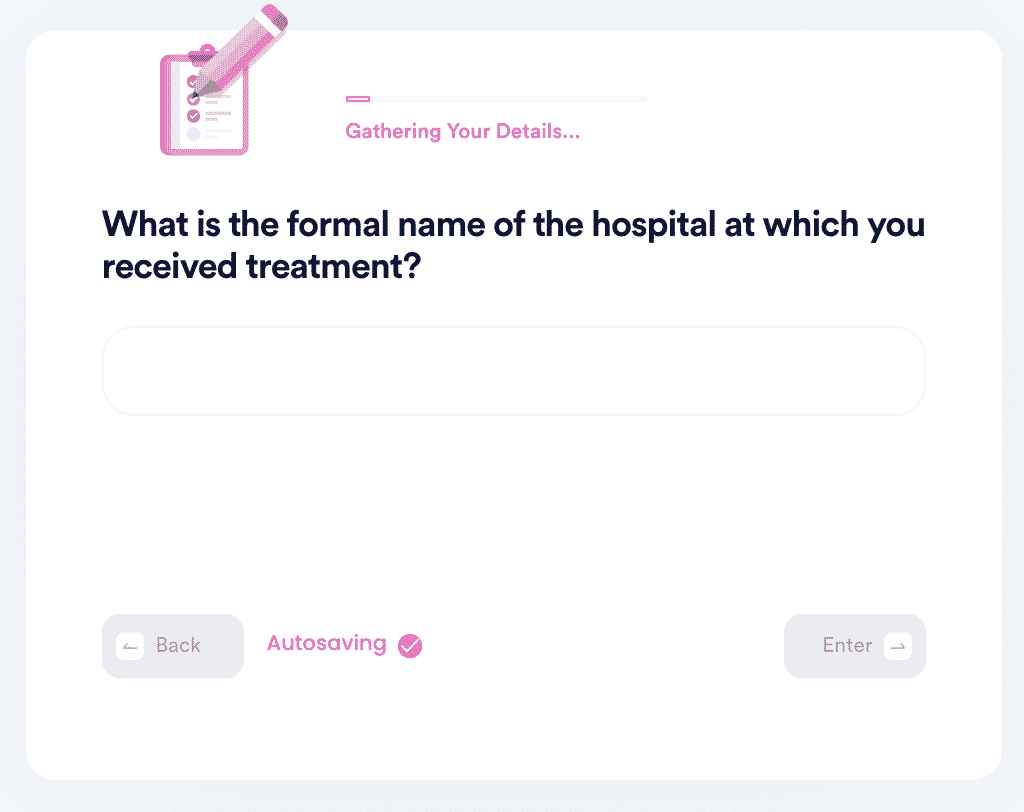
- Let us know what CPT code your visit was filed under. If you don't know, we'll generate a letter for you to send to your physician to request the code.
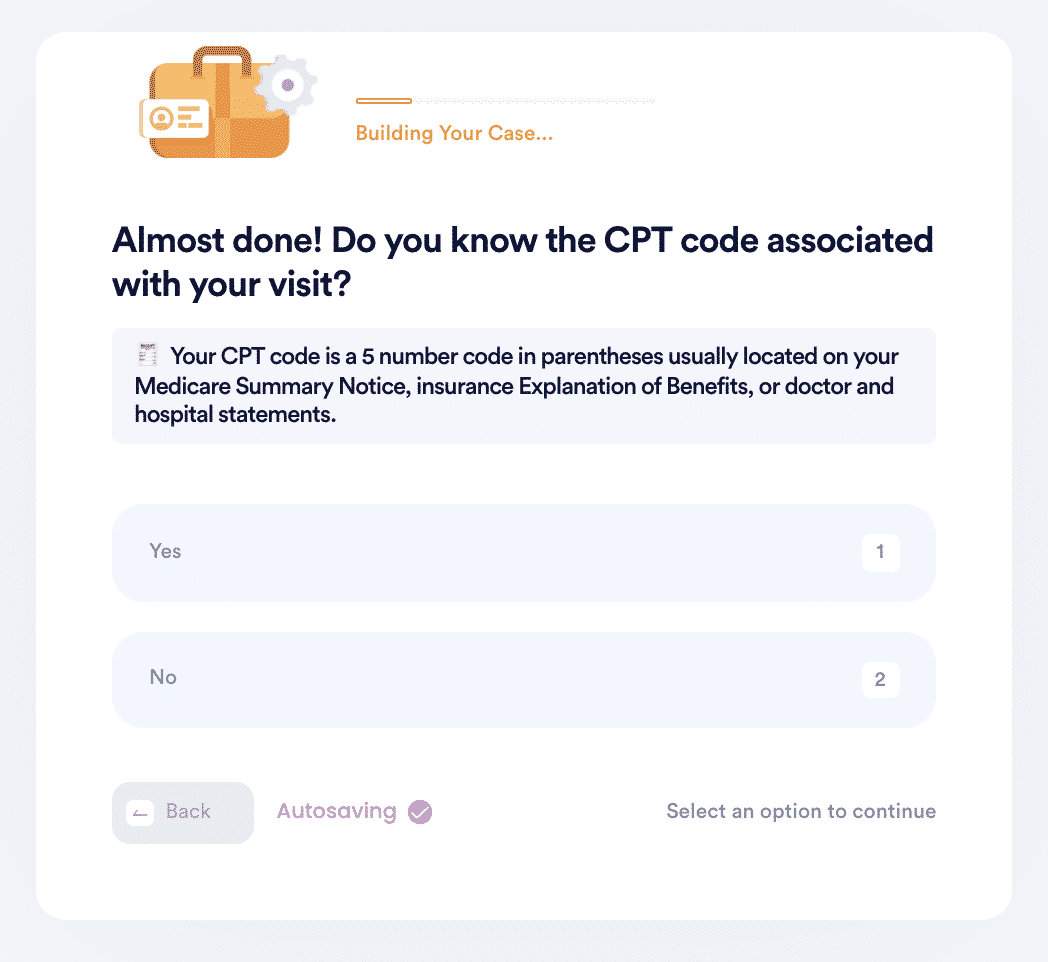
- Choose the correct CPT code or let us know if you want us to find it for you.
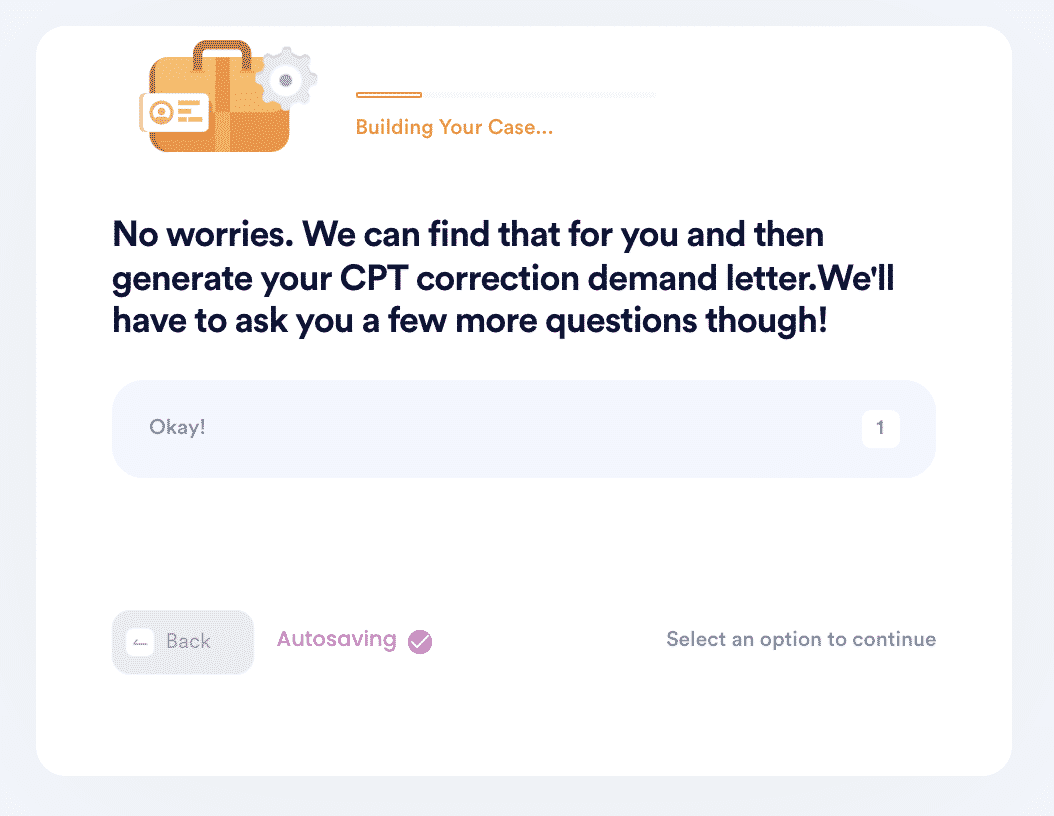
- And that's it! DoNotPay will automatically find the correct CPT code for your visit if you don't know it and then generate a demand letter on your behalf to send to your physician for a bill correction.
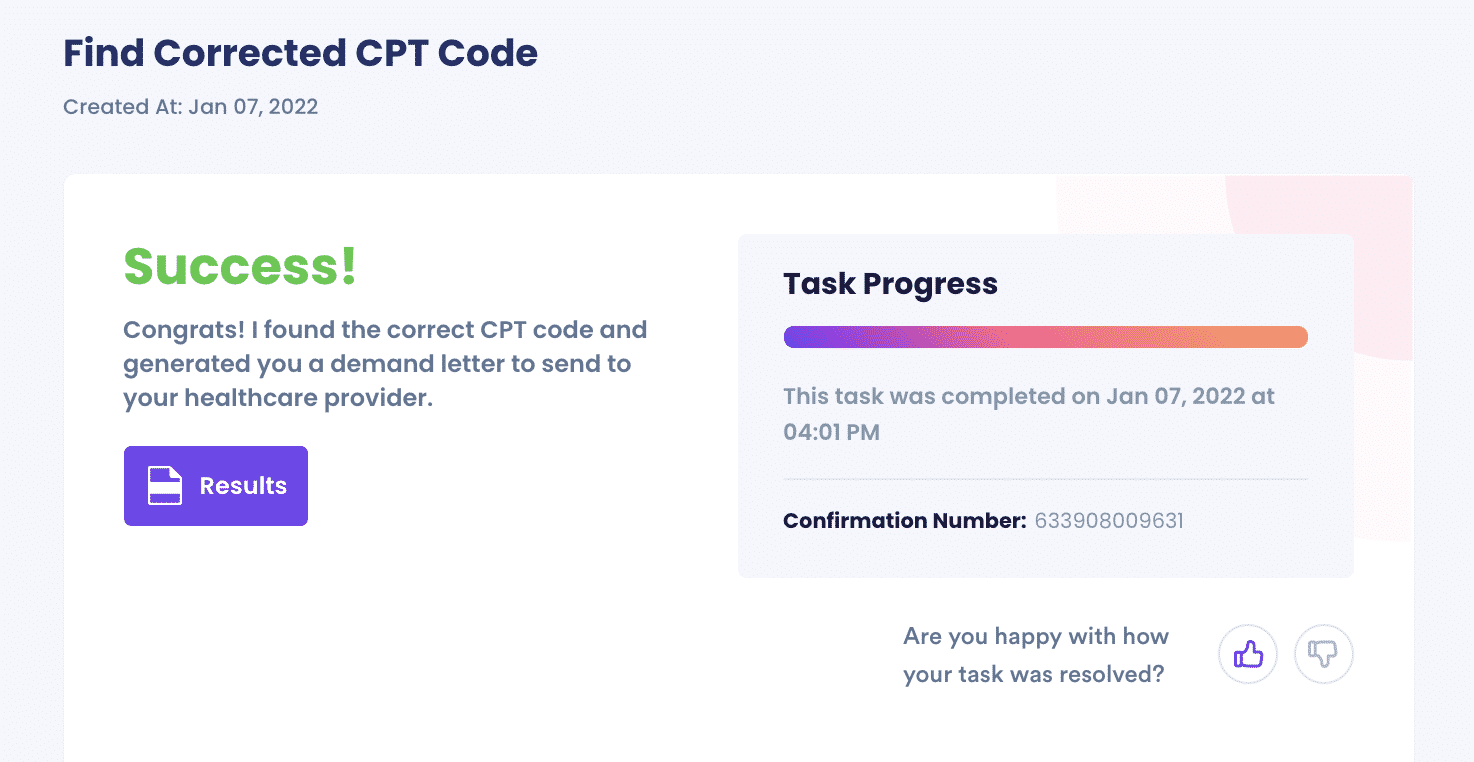
As the world's first online robotic lawyer, DoNotPay has many abilities. This extends to helping you know what ways you can report individuals suspected of fraud or abuse of health care. It is easy to get started, and there won't be any stress for you in dealing with it.
DoNotPay Doesn't Stop at Helping You Report Medical Billing Fraud
Helping you is just one service DoNotPay can provide to you. There are many more services available, both for medical issues and non-medical situations.
Non-medical situations may include suing someone in small claims court or helping you with bills. We can aid you in filing complaints, as well.
When dealing with your healthcare, we can help you
- Create
- Request Sick Leave
- Locate Birth or Death Certificates
- Tell You How to Donate Plasma
To get the process started, all you must do is join DoNotPay! We will automatically find the correct CPT code for your bill and help get your money back!
 By
By